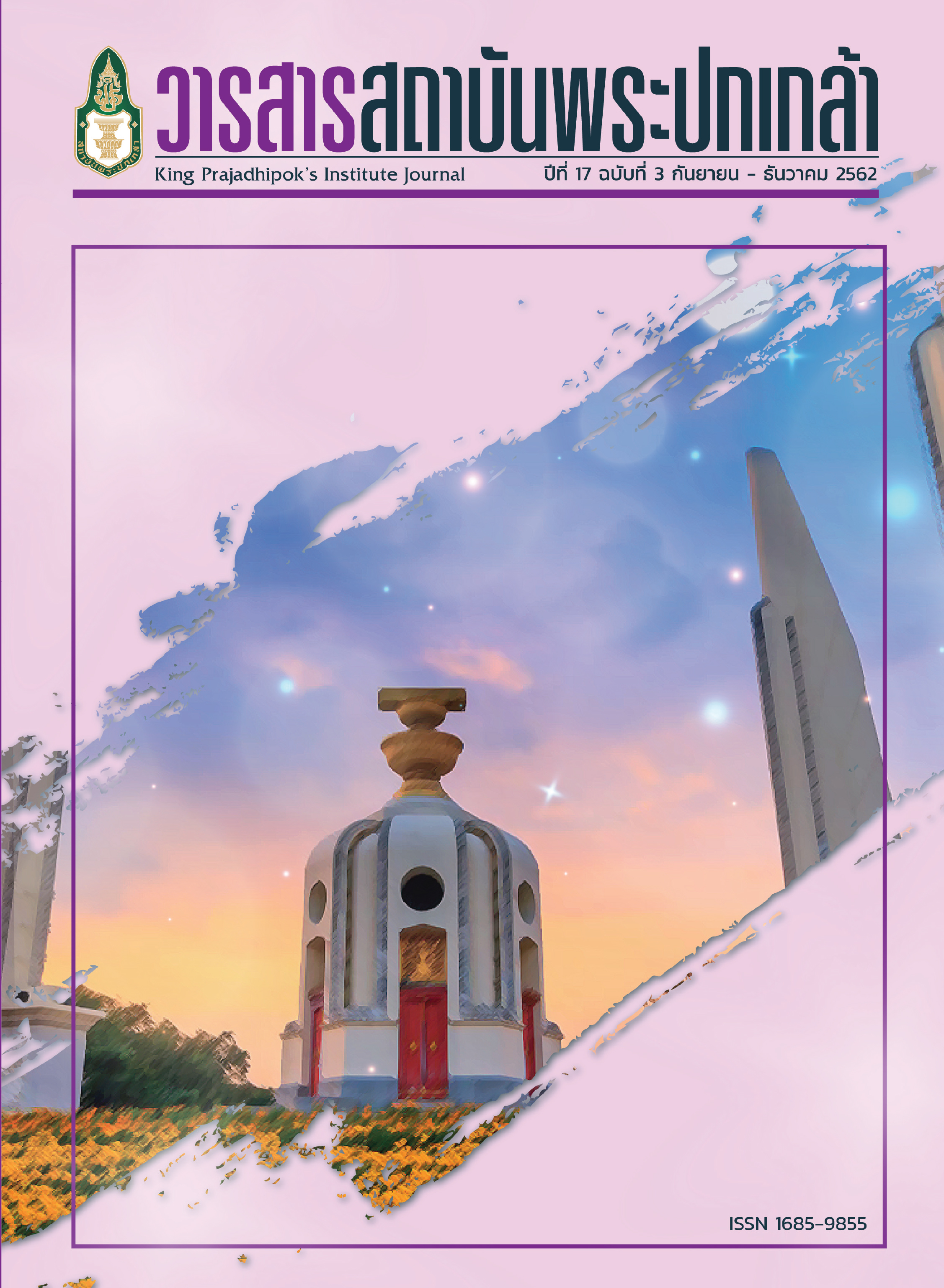Insuring Justice and Reducing Inequality at the Local Level: Challenging Missions of Local Administration
Main Article Content
Abstract
Injustice and inequality are global issues and Thailand is one of the countries affected by these problems. Insuring justice and reducing inequality at the local level are among the challenging missions of local administrative organizations, and that leads to the major point of this research: to recommend approaches for expanding the role of local administrative organizations in ensuring justice and reducing inequality. This research used qualitative research methods and the data
were analyzed through descriptive analysis. The results showed that injustice and inequality are still problems all over the world, even though there is a trend for general improvement in these areas. The severity of these problems is different in
each country. In Thailand, previous governments have had policies that put more emphasis on social welfare, but inequalities still persist. In urban areas, inequality and injustice involve economics, rights of the city-dwellers, and inequality in land use and housing. In rural areas, inequality involves economics, the utilization of natural resources (land, forest, water) and the environment, access to public health services, and social inequality. Since 1999, local administrative organizations have devised plans and projects intended to solve problems of injustice and inequality in their localities, but most local administrators have not had clear policies and goals to this end. The researcher suggests that the government and local administrators should clearly state their political will and demonstrate a sincere intention to promote justice and reduce social inequality. Education institutions should research the issue and transfer the knowledge to local administrators, other elected representatives, and the general population. Everyone should all work together to find ways to promote justice and reduce social inequality in their local areas.
Article Details
@ 2020 King Prajadhipok's Institute The Government Complex Commemorating All Right Reserved.
References
ครม. ไฟเขียวตั้งกรรมการแก้ปัญหาความยากจน ลดเหลื่อมล้ำ. (2561, ธันวาคม 18). โพสต์ ทูเดย์. สืบค้นจาก https://www.posttoday.com/politic/news/574336
ธันยพร บัวทอง. (2562, มีนาคม 11). เลือกตั้ง 2562 : ซื้อเสียง ไม่ใช่เพียงใช้เงินฟาดก็ชนะ. บีบีซีไทย. สืบค้นจาก https://www.bbc. com/thai/thailand-47520169
ประกาศคณะรักษาความสงบเรียบร้อยแห่งชาติ ที่ 85/2557 เรื่อง การได้มาซึ่งสมาชิกสภาท้องถิ่นหรือผู้บริหารท้องถิ่นเป็นการชั่วคราว. (2557, กรกฎาคม 21). ราชกิจานุเบกษา. เล่มที่ 131 ตอนพิเศษ 134 ง. สืบค้นจาก https://library2.parliament.go.th/giventake/content_ncpo/ncpo-annouce85-2557.pdf
มิ่งสรรพ์ ขาวสอาด และคณะ. (2556). เศรษฐกิจว่าด้วยการท่องเที่ยว. กรุงเทพฯ: สถาบันศึกษานโยบายสาธารณะ.
รังสรรค์ นันทกาวงศ์. นายกเทศบาลเมืองบึงยี่โถ เทศบาลเมืองบึงยี่โถ อำเภอธัญบุรี จังหวัดปทุมธานี. (11 มกราคม 2562). สัมภาษณ์.
ศิริกัญญา ตันสกุล, เศรษฐพุฒิ สุทธิวาทนฤพุฒิ, เจนจิรา โสดาสิทธิ์, ชุติมา เสนะวัต และณัฐเมธี สัยเวธ. (2557). 8 ข้อเท็จจริงความเหลื่อมล้ำในไทย มูลนิธิสถาบันอนาคตไทยศึกษา. กรุงเทพฯ: สถาบันอนาคตไทยศึกษา. สืบค้นจาก https://thaipublica.org/wp-content/uploads/2014 /04/8-ข้อเท็จจริงความเหลื่อมล้ำในไทยfull_report. pdf.
นายวันชัย จงสุทธานามณี. นายกเทศมนตรีเทศบาลนครเชียงราย เทศบาลนครเชียงราย. (22 มกราคม 2562). สัมภาษณ์.
สมจิตต์ รัตนอุดมโชค. (2552, กรกฎาคม–ธันวาคม). การซื้อสิทธิขายเสียงในจังหวัดสกลนคร. วารสารมหาวิทยาลัยราชภัฏสกลนคร, 1(2), 85-100.
สุรพล นิติไกรพจน์. (2546). ปัญหาและข้อเท็จจริงในการโอนอำนาจจัดการศึกษาให้แก่องค์กรปกครองส่วนท้องถิ่น.
วารสารวิธีวิทยาการวิจัย, 16(1), 25-56.
สำนักข่าวอิศรา. (2562, กรกฎาคม 6). เปิดกรุผลสอบสตง.(28) ตรวจสอบกองทุนหมู่บ้านและชุมชนเมือง สทบ. เสี่ยงล้มเหลว-ขาดศักยภาพ. สืบค้นจาก https://www.isranews.org/main-investigative/78191-invest-78191.html
สำนักประเมินผลการจัดการศึกษา สำนักงานเลขาธิการสภาการศึกษา. (2553). รายงานการติดตามการจัดการศึกษา ขององค์กรปกครองส่วนท้องถิ่น ปี 2551. กรุงเทพฯ: บริษัท เพลิน สตูดิโอ จำกัด.
หัชชากร วงศ์สายัณห์. (2560, กรกฎาคม-ธันวาคม). ระบบคุณค่าในวัฒนธรรมการเลือกตั้งท้องถิ่น. วารสารรัฐศาสตร์ปริทรรศน์ มหาวิทยาลัยเกษตรศาสตร์, 4(2), 187-209.
โอฬาร ถิ่นบางเตียว และนครินทร์ เมฆไตรรัตน์. (2561). การซื้อเสียง. สืบค้นจาก http://wiki.kpi.ac.th/index.php?title=การซื้อสิทธิ์ขายเสียง
Agrawa, Tushar. (2014, January). Educational inequality in rural and urban India. International Journal of Educational Development, 34, pp. 11-19. Retrieved from https://www.sciencedirect.com/science/article/pii/S0738059313000436
Asadullah, M. Niaz and Yalonetzky, Gaston. (2010). Inequality of Educational Opportunity in India: Changes over Time and across States, Draft: September 2009. Retrieved from https://editorialexpress.com/cgibin/conference/download.cgi?dbname= res2010&paperid=73
Chzhen, Yekaterina, et al. (2018). An Unfair Start Inequality in Child’s Education in The Rich Countries. Retrieved from https://www.unicef-irc.org/publications/995-an-unfair-starteducation-inequality-children.html
Dubrow, K. John. (2016, May 16). What Is Political Inequality and How Unequal Are We?. Retrieved from https://politicalinequality.org/category/definitions
Entreculturas. (2007, September 20). Poverty is a lack of education. Retrieved from https://www.entreculturas.org/noticias/poverty-lack-education
Olivier. (2017, June 26). Morocco: children deprived of an education. Humanium. Retrieved from https://www.humanium.org/en/morocco-children-deprived-education/
Peebles, Graham. (2014, January 29). Worldwide inequality. Open Democracy. Retrieved from https://www.opendemocracy.net/en/worldwide-inequality/
Fu, Teng Margaret. (2005, July-August). Unequal Primary Education Opportunities in Rural and Urban China. China Perspective. 60, pp. 1-8. Retrieved from https://journals.openedition.org/chinaperspectives/500
The World Bank. (2019). GDP Growth (annual %). Retrieved from https://data.worldbank.org/indicator/ny.gdp.mktp.kd.zg
UNESCO. (2013). Inequality in Education. programme and meeting document. Retrieved from https://unesdoc.unesco.org/ark:/48223/pf0000220440.
Ventura, Luca. (2019, April 22). The World’s Richest and Poorest Countries 2019. Retrieved from https://www.gfmag.com/global-data/economic-data/worlds-richest-and-poorest-countries
World Health Organisation. (2016). Monitoring the health gold – indicators of overall progress. World Health Statistics 2016. Retrieved from https://www.who.int/gho/publications/world_health_statistics/2016/EN_WHS2016_TOC.pdf?ua=1
World Heath Organisation. (2017). 10 facts on health inequities and their causes. Retrieved from https://www.who.int/features/factfiles/health_inequities/en/
Zhang, Dandan, Li, Xin and Xue, Jinjun. (2015). Education Inequality between Rural and Urban Areas of the People’s Republic of China, Migrants’ Children Education, and Some Implications. Asian Development Review, 32(1), pp. 196–224. Retrieved from https://www.mitpressjournals.org/doi/pdf/10.1162/ADEV_a_00042


